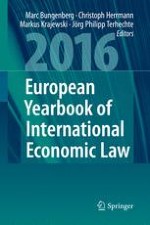2016 | OriginalPaper | Buchkapitel
Developing and Least-Developed Countries and Mega-Regional Trade and Investment Agreements
verfasst von : Emmanuel Opoku Awuku
Erschienen in: European Yearbook of International Economic Law 2016
Aktivieren Sie unsere intelligente Suche, um passende Fachinhalte oder Patente zu finden.
Wählen Sie Textabschnitte aus um mit Künstlicher Intelligenz passenden Patente zu finden. powered by
Markieren Sie Textabschnitte, um KI-gestützt weitere passende Inhalte zu finden. powered by
